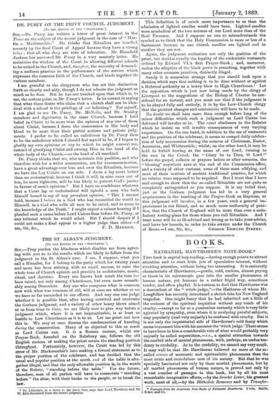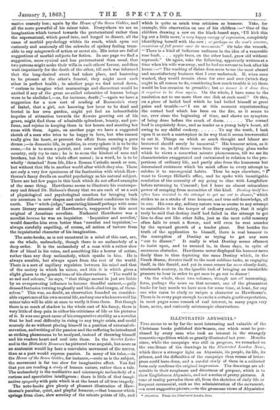BOOKS.
NATHANIEL HAWTHORNE'S NOTE-BOOK.* Tuts book is capital lazy reading,—having enough points to attract attention and to start little jets of speculative interest, without rivetting attention, without being too interesting. It is eminently characteristic of Hawthorne,—gentle, cold, curious, almost prying at times in its microscopic gaze into the smaller phenomena of human nature, yet humane in a rather frigid way, sometimes tender, and often playful. It is curious to find that Hawthorne was a descendant of the "witch-judge,"—the Hathome of whom Mr. Longfellow has recently introduced a sketch into his New England tragedies. One might fancy that he had inherited not a little of the eeriness of the spiritual inquisitor without any touch of his cruelty,—except so far as a passionless curiosity which is very little agitated by sympathy, even where it is analyzing painful subjects, may popularly (and very unjustly) be confused with cruelty. But it is not only the inquisitorial side of Hawthorne's cold fancy which seems to connect him with his ancestor the 'witch judge.' There seems to have been in him a considerable vein of what would probably very unjustly be called superstition,—i.e., a special attraction towards the morbid side of mental phenomena, with, perhaps, an undue tendency to credulity. As to the credulity, we cannot say very much. It may well be that Mr. Hawthorne believed no more of the weaned science of mesmeric and spiritualistic phenomena than the most acute and incredulous men of his society. But that he was specially fascinated not only by these morbid phenomena, but by all morbid phenomena of human nature, is proved not only by a vast number of passages in this book, but by all his most remarkable imaginative efforta, —by the Scarlet Letter, his greatest work, most of all,—by the Blithedale Romance and by Transfer nation scarcely less; again by the House of the Seven Gables, and all the more powerful of his minor tales. Everywhere we see an imagination which turned towards the preternatural rather than the supernatural, which gazed into, and longed to dissect, all the cases of morbid psychology within its reach, which spun out curiously and anxiously all the cobwebs of spidery feeling traceable to any misgrowth of action or secret sin. His notes are full of suggestions of morbid subjects for fiction. In one page we find a suggestion, more cynical and less preternatural than usual, that two persons might make their wills in each others' favour, and then wait impatiently for the death of the other, till each was informed that the long-desired event had taken place, and hastening to be present at the other's funeral, they might meet each other in perfect health ; in another page we find noted down, "curious to imagine what murmurings and discontent would be excited if any of the great so-called calamities of human beings were to be abolished,—as, for instance, death ;"—again we have a suggestion for a new sort of reading of Boccaccio's story of Isabel, that a girl, not knowing her lover to be dead and buried in her own garden, might yet feel an indescribable impulse of attraction towards the flowers growing out of his grave, might find them of admirable splendour, beauty, and perfume, and rejoice in keeping them in her bosom and scenting her room with them. Again, on another page we have a suggested sketch of a man who tries to be happy in love, but who cannot really give his heart, or prevent the affair from seeming a pure dream ;—in domestic life, in politics, in every sphere it is to be the same,—he is to seem a patriot, and care nothing really for his country, only try to care ; he is to seem the kindest of sons and brothers, but feel the whole effort unreal ; in a word, he is to be wholly 'detached' from life, like a Roman Catholic monk or nun, but without that life in another world after which they aim. These are only a very few specimens of the fascination with which Hawthorne's fancy dwells on morbid psychology as his natural subject. There are but few pages in this book which do not afford examples of the same thing. Hawthorne seems to illustrate his contemporary and friend Dr. Holines's theory that we are each of us a sort of physiological and psychological omnibus for bringing back our ancestors in new shapes and under different conditions to this earth. The "witch-judge," associating himself perhaps with some more literary ancestor of Hawthorne's, reappeared in this most original of American novelists. Nathaniel Hawthorne was a novelist because he was an inquisitor. 'Inquisitor and novelist,' would describe him even better than 'novelist and inquisitor,'— always carefully expelling, of course, all notion of torture from the inquisitorial character of his imagination.
The note-books, as is not unnatural in a mind of this cast, are, on the whole, melancholy, though there is no melancholy of a deep order. It is the melancholy of a man with a rather slow flow of blood in his veins, and something like a horror of action, rather than any deep melancholy, which speaks in him. He is always sensible, but always apart from the rest of the world. There is a sort of capillary repulsion between his mind and that of the society in which he mixes, and this it is which gives a slight gloom to the general tone of his observations. "The world is so sad and solemn," he says, "that things meant in jest are liable by an overpowering influence to become dreadful earnest,—gaily
dressed fantasies turning to ghostly and black-clad images, of themselves." This was, no doubt, an observation founded on consider able experience of his own mental life, and any one who knows well his minor tales will be able at once to verify it from them. But though there is so much of shadow in the whole cast of his fancy, there is very little of deep pain in either his criticisms of life or his pictures of it. It was one great cause of his comparative sterility as a novelist that he had real difficulty in rising to any tragic crisis, and could scarcely do so without placing himself in a position of external ob servation, and writing of the passion and the suffering he introduced as striking phenomena to be analyzed, instead of throwing himself
and his readers heart and soul into them. In the Scarlet Letter and in the Blithedale Romance he pictured true anguish, but more as an anatomist would lay bare a convulsive movement of the nerves,
than as a poet would express passion. In many of his tales,—in
the House of the Seven Gables, for instance,—eerie as is the subject, the movement is far too slow for imaginative effect. You feel that you are reading a study of human nature, rather than a tale.
The melancholy is the meditative and microscopic melancholy of a curious and speculative intelligence ; there is little of that imagi
native sympathy with pain which is at the heart of all true tragedy. The note-books give plenty of pleasant illustration of Hawthorne's peculiar, quiet, and playful humour,—that humour which springs from close, slow scrutiny of the minute points of life, and
which is quite as much true criticism as humour. Take, for example, this observation on one of his children :—" One of the
children drawing a cow on the black-board says, kick this leg out a little more,' a very happy energy of expression, completely identifying herself with the cow ; or perhaps as the cow's creator, conscious of full power over its movements." Or take the remark, "There is a kind of ludicrous unfitness in the idea of a venerable rose bush. . . . apple trees, on the other hand, grow old without reproach." Or again, take the following, apparently written at a time when his wife was away, and he had no servant to look after his house :—" The washing of dishes does seem to me the most absurd and unsatisfactory business that I ever undertook. If, when once washed, they would remain clean for ever and ever (which they ought in all reason to do, considering how much trouble it is) there would be less occasion to grumble ; but no sooner is it done than it requires to be done again. On the whole, I have come to the resolution not to use more than one dish at each meal." Or this, on a piece of boiled beef which he had boiled himself at great pains and trouble:—" I am at this moment superintending the corned beef which has been on the fire, as it seems to me, ever since the beginning of time, and shows no symptom
of being done before the crack of doom The corned beef is exquisitely done, and as tender as a young lady's heart, all
owing to my skilful cookery To say the truth, I look upon it as such a masterpiece in its way that it seems irreverential to eat it. Things on which so much thought and labour are bestowed should surely be immortal." His humour arises, as it seems to us, in all these cases from the magnifying glass under which he views a somewhat minute phenomenon, till we see its characteristics exaggerated and caricatured in relation to the proportions of ordinary life, and partly also from the humorous but determined resistance which his mind offers to every attempt to subdue it to uncongenial habits. Thus he says elsewhere, " went to George Hillard's office, and he spoke with immitigable resolution of the necessity of my going to dine with Longfellow before returning to Concord ; but I have an almost miraculous power of escaping from necessities of this kind. Destiny itself has often been worsted in the attempt to get me out to dinner," which strikes us as a stroke of true humour, and true self-knowledge, all in one. His own shy, solitary nature was so averse to any attempt to assimilate it to the temper of ordinary society, that it might truly be said that destiny itself had failed in the attempt to get him to dine out like other folks, just as the most solid masonry often fails to crush a flower, and will even be rent asunder by the upward growth of a tender plant. But besides the truth of the application to himself, there is real humour in the conception of Destiny as trying to get any man "out to dinner." It really is what Destiny seems oftenest to insist upon, and to succeed in, in these days, in spite of enormous obstacles. Hawthorne never displayed his humour more finely than in thus depicting the same Destiny which, in the Greek drama, devotes itself to the most sublime tasks, as engaging itself, in this flaccid, and yet in some senses far more closely-knit, nineteenth century, in the ignoble task of bringing an irresistible pressure to bear in order to get men to go out to dinner !
On the whole, these two volumes, though not all interesting, form, perhaps the more on that account, one of the pleasantest books for lazy moods we have seen for some time, at least, for any one who cares to study so unique a character as Hawthorne's. There is in every page enough to excite a certain gentle expectation, in most pages some remark of real interest, in many pages very keen, acute, and curiously microscopic observations.











































 Previous page
Previous page